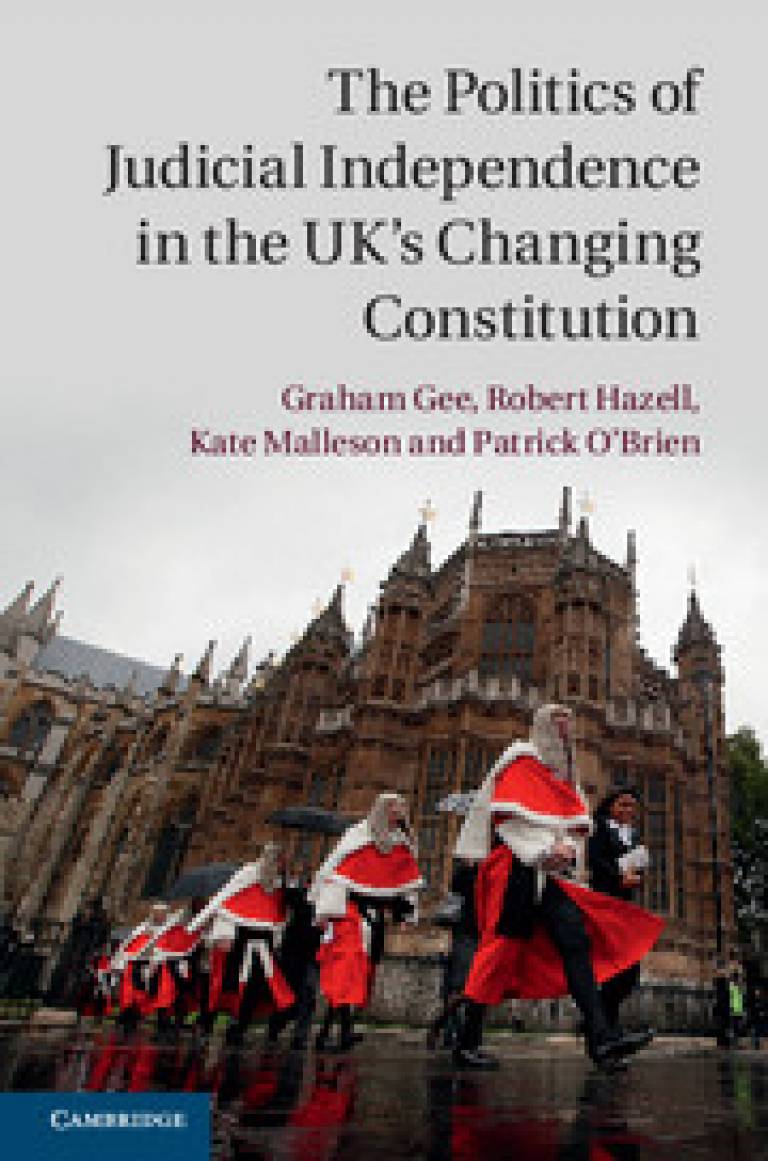Press Release: The Politics of Judicial Independence in the United Kingdom's Changing Constitution
17 June 2015

The Constitution Unit at UCL are
pleased to announce the publication of The Politics of Judicial Independence
published by Cambridge University Press. This was the product of a big
collaborative research project with Graham Gee (Birmingham), Robert Hazell
(UCL), Patrick O'Brien (LSE) and Kate Malleson (Queen Mary).
The book
The book is based on three years of research which included over 150 interviews and 10 seminars with leading judges past and present, politicians, officials and lawyers. It traces the impact of the profound changes on the independent operation of the UK judiciary which stemmed from the Constitutional Reform Act of 2005.
These reforms did not begin smoothly. They began with the abrupt dismissal of the Lord Chancellor Lord Irvine in 2003 and finally emerged after detailed and often tense negotiations between the judges and Tony Blair's government, ending up in compromises between the two sides that are still being worked through more than a decade later. They terminated the three-fold operation of the office of Lord Chancellor as head of the judiciary, Speaker of the House of Lords and a cabinet minister. They created a Supreme Court, a more independent system for appointing judges, and a judiciary more separate and more powerful than before, with greater responsibility for managing their own affairs. The judiciaries of Scotland and Northern Ireland are considered in a separate chapter.
Among the key insights of the book:
- Judicial independence is a political achievement. Politics is not the enemy. To safeguard their independence, judges need to engage more with politicians, not less.
- Judicial independence is not a fixed concept. At its core is the need for individual judges to be able to decide cases according to the law, free from any improper pressure. But, everything else is negotiable, and is continuously being negotiated.
- Regular close consultation between the judges and the other branches of government is necessary to avoid the risks of detachment leading to mutual misunderstanding.
- Parliament is a central guardian of judicial independence, with the new Select Committees more constant and systematic guardians than were the law lords.
- The Judicial Appointments Commission is now an efficient recruitment agency but the judiciary has too much influence in the selection process.
- The reduction of the Lord Chancellor's role to rubber stamping appointments has undermined attempts to improve judicial diversity. The Lord Chancellor should be given real choice in relation to senior appointments, with a short list of three names.
- The judiciary and judicial independence have emerged stronger from the 2005 changes, with the inclusion of Tribunals into the judiciary and the courts system, a more independent and visible Supreme Court, and greater autonomy of the Lord Chief Justice as the new head of a more professionalised judiciary.
- Judicial accountability is also stronger, in particular through the frequent appearances by the LCJ and other judges before parliamentary committees. But the LCJ needs to submit an annual report, and parliamentary committees need to learn to be less deferential.
The launch
The book will be launched at our project's final conference on 22 June at the Institute for Government in London, attended by invited judges, politicians, officials and commentators. The keynote address will be given by the Lord Chief Justice of England and Wales Lord Thomas of Cwmgiedd.
The video interviews
The book will be accompanied by The Judicial Interviews, a unique set of seven conversations conducted for the archive by Joshua Rozenberg. Giving their individual reflections on the passage and progress of the radical reforms are the previous Lord Chancellors Lord Mackay, Lord Falconer, Jack Straw and Kenneth Clarke MP; and past Lord Chief Justices Lord Woolf, Lord Phillips (who was also the first President of the UK Supreme Court) and Lord Judge. The interviews will appear shortly on LSE Law's Legal Biography website and the YouTube channels of the LSE and UCL.
Notes for Editors
- The Constitution Unit is an independent, non-partisan research centre based in the Department of Political Science at University College London.
- The book is published by Cambridge University Press, and copies can be ordered here
- The book is the main product of a big three year research project funded by the AHRC
- The project's web pages can be found here
- For further information contact: The Constitution Unit director Professor Robert Hazell r.hazell@ucl.ac.uk , 0207 679 49770207 679 4977 or the Units' press officer Brian Walker: williambrianwalker@gmail.com
 Close
Close


